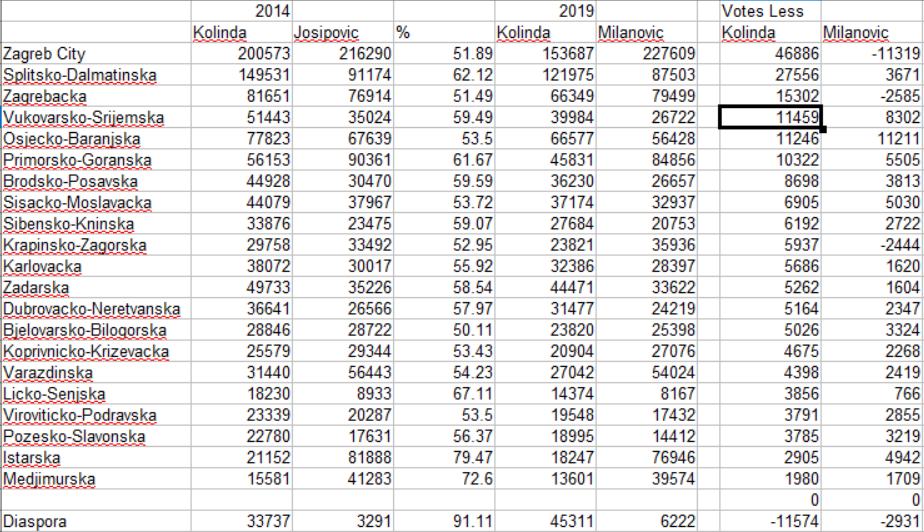Croatian Zoran Milanović First Former Prime Minister Elected President
Although only 53 years old, Croatian President-elect Zoran Milanović is already a political veteran. Since Croatia's independence, he is the only politician to be elected to two of the most important state functions, first as prime minister and now president.
He was born on October 30, 1966 in Zagreb. In private conversations, he likes to point out that Zagreb shaped his identity, but was also intrigued by his family history, according to Robert Bajruš/Jutarnji List on January 6, 2020. Therefore, Milanović researched archives from Austrian barracks and the Sinj monastery in a quest for information on his ancestors and their life paths. Zoran Milanović's family is from western Bosnia and arrived in the Sinj region as part of a mass migration led by Franciscan Friars in 1687. His mother Đurđica Matasić's family has lived in Sinj for almost two centuries.
Father Held Key Zagreb Government Positions
His father, Stipe Milanović, performed several important roles during the socialist regime: he was Cabinet Secretary to Miko Tripalo, a Zagreb city council member and chaired the Vatroslav Lisinski Hall Construction Committee. In the early 1990s, he joined HDZ (Croatian Democratic Union) and became Assistant Minister to Vlatko Pavletić.
Milanović's claim that his grandfather was an Ustasha member (Croatian WWII Fascists) was one of the more interesting developments in the 2016 election campaign. He was referring to his mother Đurđica’s stepfather, Petar Plišić, but had kept silent about him until then.
He graduated from the Faculty of Law in Zagreb in the early 1990s where he was an excellent student. He received the Rector's Award and participated in the "Telders" competition in public international law at The Hague.
Began Post Law School Career in Foreign Diplomacy
Milanović landed his first job at the Commercial Court in Zagreb and then the Ministry of Foreign Affairs in 1993, where he arrived upon the recommendation of Ivan Šimonović, professor at the Faculty of Law and Permanent Representative of the Republic of Croatia to the UN. He became advisor to the Croatian Mission to the European Union and NATO in Brussels in 1996 and completed a postgraduate certificate in European Union law there two years later.
He joined SDP (Social Democratic Party of Croatia) immediately after his return to Zagreb in 1999. After SDP won the January 3, 2000 elections as part of a coalition, he was entrusted with a position in communications with NATO. Three years later, he was appointed Assistant Minister of Foreign Affairs under Tonino Picula. However, he left diplomacy and was brought onto the SDP Executive Board at the invitation of Ivica Račan after the HDZ won the 2003 elections.
Assumed SDP Leadership Role After Račan
The SDP party membership overwhelmingly chose Milanović as their new leader when Ivica Račan died in 2007. He had defeated Željko Antunović, Milan Bandić and Tonino Picula; the party’s old guard. While Račan had not considered him his successor; within a month Milanović had taken control of SDP and set about overthrowing Ivo Sanader.
Diana Pleština, widow of the former SDP leader, spoke about the Račan-Milanović relationship. While she has always thought well of Milanović; she also noted:
"Ivica Račan understood that Milanović was young and well-educated, and had experience communicating with the outside world, but he was not referring to Zoran Milanović in the phrase 'New SDP Force'. Instead he was referring to Milanović along with other members of the party. Therefore, the ‘New SDP force’ was not referring to one person, but an overall proposal to continue the rejuvenation of the Social Democratic Party, and one of those players was Milanović,” Dijana Pleština recalled.
However, he lost to Ivo Sanader in the 2007 parliamentary elections and spent the next four years leading the opposition. During that time, he was able to marginalize the old guard within SDP and surround himself with a new generation of associates including Ranko Ostojić, Siniša Hajdaš Dončić, Rajko Ostojić, Ante Kotromanović, Igor Dragovan and Gordan Maras.
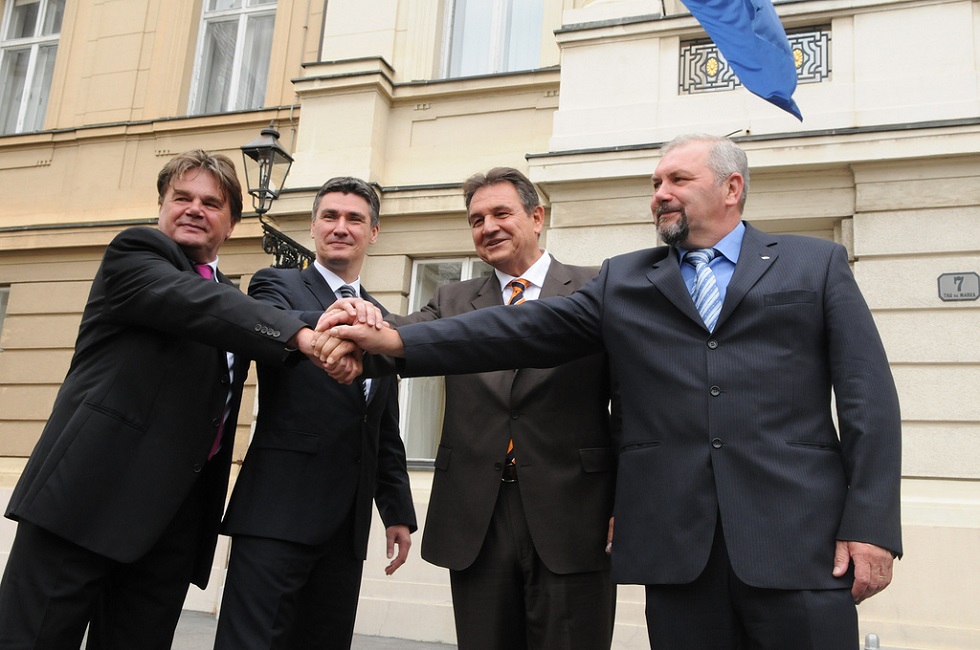
Defeated Scandal Ridden HDZ With Kukuriku Coalition
In November 2011, under Milanović’s leadership, the SDP-HNS-IDS-HSU coalition overwhelmingly defeated HDZ, which had been rocked by a series of corruption scandals. Their coalition ruled Croatia for the next four years. Before that victory, Milanović played a crucial role in the election of SDP presidential candidate Ivo Josipović. Josipović's victory had a strategic effect on the downfall of HDZ and Prime Minister Jadranka Kosor, and subsequent victory of the four-party coalition.
Milanović's political experience did not often reveal itself during his first three years in office. In the face of poor economic performance, he was subject to widespread criticism for refusing to make severe cuts to a bloated and inefficient state administration, which was stifling the economy. In addition, almost nobody believed he could make a comeback after he barely succeeded in expelling Slavko Linić from SDP in June 2014. Those doubts were strengthened after Kolinda Grabar-Kitarović narrowly defeated Ivo Josipović in the 2015 presidential election.
"Who would have thought that we were capable of regaining voter confidence back in January," Milanović recently suggested in a private interview.
Political Personal Evolution and Move to Right
Nevertheless, he changed tremendously and became much more accessible while choosing to remain silent about the confrontation with Linić. Even then, a well-known SDP politician revealed that he had been closely observing Milanović's career for seven years, and denied the widespread belief that the SDP chief was incapable of transforming himself:
"After losing the election to Ivo Sanader in 2007, Milanović realized that he had to change. He succeeded because he strengthened the party with new young talent. I’ve also changed and have begun displaying a better part of my character in interactions with people. That’s why I believe he can also change in a positive way,” claimed this member of government.
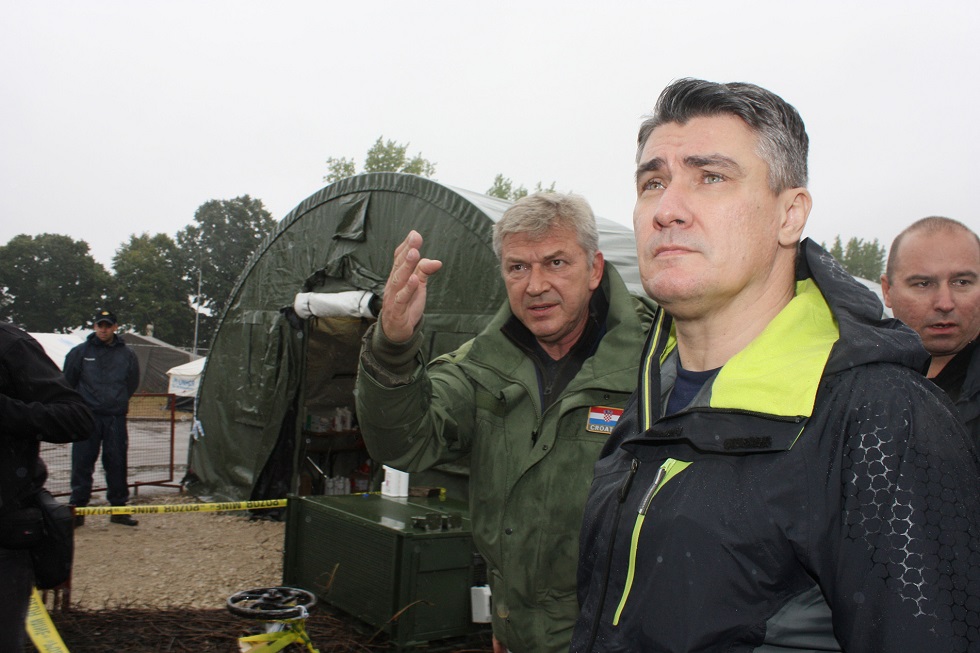
Praise for Franjo Tuđman and Croatian Nation in Knin
After all, Milanović's metamorphosis, which manifested itself in a slight turn to the right, was first noticed in Knin on August 5, 2014 when he gave a speech commemorating Dan domovinske zahvalnosti (Homeland Thanksgiving Day), which suggested a more patriotic direction. It was then that he first came forward with the conviction that his government was a people's government elected by the Croatian nation, comprised of people who are of primarily Croatian background. "As long is that is the case, we will oversee this country and lead it on the right path with Croatian interests in mind," Milanović said.
Milanović also paid respect to the first Croatian president, Franjo Tuđman, "because he was the Croatian president during a most difficult and challenging time."
“We have been waiting for a thousand years to have our own state and are grateful to those who gave everything for our country. For thousands of years we have worked, fought and died for foreigners, who treated us like foreigners, but they are not our enemies today. We are united with them in the EU and are building a better future together,” said Milanović in Knin.
It was the beginning of a 16-month campaign in which Zoran Milanović decided to tackle the stigma of (Croatian) leftists and present himself as a self-aware national leader. A social democrat who respects Tuđman, frequently mentions Croatia and condemns chauvinism then became his election-winning formula.
He also hired PR expert Alex Braun and his government achieved positive economic results in 2015. However, Milanović narrowly lost the parliamentary elections, remained at the helm of the SDP and defeated his old rival, Zlatko Komadin, in party elections.
Withdrawal from Politics After 2016 Defeat
After the fall of Prime Minister Tim Orešković’s short-lived administration in late 2016, Milanović led the People's Coalition into the elections, but lost, and then announced that he was withdrawing from politics.
In November 2016, he founded EuroAlba Advisory. Earlier this year, the media reported that the company's total 2018 revenue was 744,970 HRK (99,700 EUR), about a 20 percent increase from a 2017 reported revenue of 625,000 HRK (83,600 EUR).
Milanović lost his father Stipe and his younger brother Krešimir, who died after a short illness, during his election campaign late last year.
Follow our Politics page to stay updated on the new Croatian presidency and upcoming 2020 parliamentary elections.
Milanovic Didn't Win, Kolinda Lost: 2014 v 2019 and the BiH Anomaly
January 6, 2020 - A quick comparison of the Croatian Presidential election results o 2014 and 2019 shows where Kolinda lost, as well as a rather interesting anomaly in the diaspora.
The people have spoken, and Croatia has voted for a new President, former SDP Prime Minister Zoran Milanovic, who beat incumbent HDZ President Kolinda Grabar-Kitarovic by a comfortable margin of more than 100,000 votes, 52.67% to 47.33%, 1,034,389 votes to 929,488, a margin of victory of 104,901.
International media are reporting that voters moved to the left, but a little research into the statistics of the 2014 election, where Grabar-Kitarovic beat Ivo Josipovic in a tight race, shows that the outcome of the election was more a case of people not voting for the candidate on the right, rather than voting for the man on the left.
Kolinda's 929,488 votes compared very poorly with her 2014 haul of 1,114,945, down a massive 20%, while Milanovic actually got less votes than Josipovic's 1,082,436
This was more a case of an election lost than an election won. A quick look at the official results from both elections show where Kolinda lost the battle - right in the heart of Zagreb. Not only did almost 50,000 less people in the capital vote for her than 5 years previously, but it was one of only three regions in the country (Zagreb County and Krapinsko-Zagorska were the others) where more people voted for Milanovic than Josipovic. The 2019 swing in the city of Zagreb alone was 58,205, more than half the margin of victory.
As you can see from the table above, the other main regions to desert Kolinda were HDZ strongholds in eastern Croatia, as well as Splitsko-Dalmatinska. In fact, the only place where Kolinda increased her vote from 2019 was in the diaspora, where there was a significant increase in the vote for both candidates... but herein lies an interesting story.
We recently took a closer look at the voting patterns in Croatian elections and referenda. The diaspora is a very vocal and influential part of Croatian society, with their remittances more than 2 billion euro a year (more than direct foreign investment in Croatia), and I was surprised to see how few of them actually voted, particularly in Australia, which has arguably the most vocal diaspora of all. Just over 1,000 Australian Croats votes in the first round of the Presidential elections. You can see more about the diverse voting patterns among the Croatian diaspora in this TCN feature.
So with such a surge in support for Kolinda abroad, surely this showed that the diaspora was rallying in support for their HDZ President.
Well, not quite...
Votes for Kolinda were sharply down in the countries with large Croatian diaspora - Germany, Australia, Canada, USA - and mirrored the voting patterns within Croatia. With one big exception. Bosnia and Hercegovina.
While not a single other region increased their vote for Kolinda (unless you count 7 extra votes in Ireland after the huge exodus there over the last few years), not only did the very loyal HDZ base in Hercegovina increase the vote, they more than doubled it, from 16,160 votes in 2014, to 32,647 yesterday.
And if the statistics of the diaspora are analysed without BiH, they make for fairly grim reading for Kolinda as well. The overall vote for her was about a third less, while Milanovic increased the Josipovic vote in all key countries. The diaspora preference for HDZ is still huge, but in terms of voting patterns, there seems to be a small trend developing.
Is it all bad news for HDZ? Not at all. This was an election lost by voters not turning up, rather than people voting en masse for the other side. Perhaps a few lessons learned in voter turnout from those chaps in Siroki Brijeg or Ljubuski could do the trick...
For the latest in politics from Croatia, follow the dedicated TCN section.
Prime Minister Plenković Expects Hard Cohabitation with President-Elect Milanović
ZAGREB, January 6, 2020 - Prime Minister Andrej Plenković congratulated Zoran Milanović on winning the presidential election on Sunday, saying he expected a hard cohabitation in accordance with the constitution and law.
"I congratulate Zoran Milanović on winning the trust of the majority of the Croatian electorate in the second round of the presidential election and wish him success in his work. We will work together in accordance with our constitutional powers and the law," Plenković told the press after Milanović, the candidate of the Social Democratic Party (SDP) and several other centre-left parties, won the runoff election against the incumbent president and candidate of the ruling Croatian Democratic Union (HDZ), Kolinda Grabar-Kitarović.
He added that he would call Milanović to congratulate him on his victory.
Plenković thanked Grabar-Kitarović for her five years in office and her commitment to working for the benefit of Croatia and all its people, strengthening the country's international standing and ensuring the harmonious functioning of all institutions of the state.
He also thanked all HDZ members who had done their best in the campaign so that Grabar-Kitarović would win a second term, as well as all partner parties and their voters for their support to the outgoing president.
Asked if the result of the vote was also a message to him, Plenković said that the HDZ would analyse the election results and why their candidate lost. He said that there were several reasons, recalling that he had said during the campaign in the run-up to the first round that every vote from the right side of the political spectrum that went to Miroslav Škoro, a singer-turned-politician backed by right-wing anti-establishment parties, was a vote for Milanović.
He also mentioned the fact that 4.6 percent of votes in the runoff were declared invalid, adding that this was a huge number. "When people give instructions on how to vote in the second round, they are expected to be mature and responsible. Those were not mature messages," he said alluding to Škoro.
Asked if the HDZ would now go more to the right to win back Škoro's voters, Plenković said that no one owned voters. "Our citizens are smart, wise and responsible, and what is important in every election competition, they should get informed and not fall for sugarcoated lies that abound in politics."
As for pretenders to his position as the HDZ leader, Plenković said that "it is a good position and there are many who crave for it." Asked to comment on the statement by his deputy Milijan Brkić that he would run for the HDZ leadership, Plenković said he respected everyone's ambition and that anyone who wanted to run should do so.
Plenković said that in the three years of his term they had done a lot for the HDZ and its membership, modernising the party and consolidating it financially.
Asked if a grand coalition with the SDP was possible for the next parliamentary election, due this autumn, Plenković said he would do all he could to ensure that the HDZ won the parliamentary election again.
More news about the presidential elections can be found in the Politics section.
President-Elect Milanović Pledges to Live Up to Trust Placed in Him
ZAGREB, January 6, 2020 - Croatia's President-elect, Zoran Milanović, said in his first address after the presidential runoff on Sunday that he hoped he would not let down the people who placed their trust in him.
During his speech, interrupted by greetings and chants of about 1,000 jubilant supporters and Social Democratic Party officials and members in his election headquarters, Milanović said that the election campaign was "tough, long and not always fair."
"However, politics is a passionate job, full of love and sometimes filled with intolerance, and I did my best," said the fifth elected president of Croatia since the country gained independence.
Milanović thanked his rival Kolinda Grabar-Kitarović in his victory speech, and the mentioning of the name of the incumbent president was booed by his supporters which Milanović quickly stopped and urged that a similar situation "happened five years ago and should never happen again."
Milanović went on to say that Croatian voters had elected him to be the president of the republic, the president of all citizens, both ethnic Croats and people of other ethnic backgrounds. "I am happy about that!"
"In my life I have done other things as well. I was a prime minister and that has been a burden on this path (towards presidency). I am aware that not everyone likes me. We must live with that and move on because we are few, we are not successful enough and cannot afford to divide ourselves," Milanović said.
He went on to say that he would not tell "touching tales about unity" and that he would not make unrealistic promises.
"People differ from one another, and I will try not to insult anyone and I will try to pursue dialogue, aware that there are different people among us, with different worldviews, with prejudices, to which I myself am not immune because I am just a human being," said Milanović, whose presidency bid is supported by the SDP and several opposition parties from the left spectrum.
"The four million of us (Croatian citizens) are seeking our own place under the sun, and a niche on the journey we are travelling, a place in Europe which, despite all the problems it faces, is the most beautiful place and continent to live in, and we are part of that continent," he added.
Milanovic said in this context that he would cooperate with the government, and ruled out any desire for greater powers on his part.
"There will be no plotting, no secret deals. I will treat all political parties equally, because we are a multiparty parliamentary democracy. It is not perfect, but there is nothing better than that. Any other way would lead to autocracy, tyranny, arbitrariness, plunder, and the President of Republic must be an obstacle to that," said Milanović.
"If this narrow but fair and clear victory of mine gives some faith and some spirit to our society and to our people, I am a happy man and let us rejoice together," Milanović concluded in his victory speech.
More news about Zoran Milanović can be found in the Politics section.
Croatia Presidential Election: Milanović Defeats Incumbent Grabar-Kitarović
According to final election results, released at 5:30am CET (Central European Time) on January 6, 2020; former Prime Minister Zoran Milanović has defeated incumbent Croatian President Kolinda Grabar-Kitarović and won his first five-year term as President of Croatia.
Here is a breakdown of the final election results with 100% votes processed (updated 5:30am CET):
52.67% - Zoran Milanović – Former Prime Minister | SDP
47.33% - Kolinda Grabar-Kitarović – Incumbent President | HDZ
Former Croatia Prime Minister Began Career as Diplomat
Zoran Milanović, born in 1966; was Prime Minister of Croatia from 2011 to 2016. He was also the leader of SDP (Social Democratic Party of Croatia), the largest center-left political party, from 2007 to 2016. He served as leader of the opposition twice, from 2007 to 2011 and for several months in 2016.
Milanović began his career in the Croatian Ministry of Foreign Affairs. He served as advisor at the Croatian Mission to the European Union and NATO and was assistant to the Foreign Minister of Croatia for political multilateral affairs.
Oversaw Croatia Entry Into EU in 2013
In June 2007, Milanović was elected President of SDP and formed a coalition uniting four center-left political parties, which won an absolute majority in the 2011 parliamentary election. He became Prime Minister later that year and oversaw Croatia’s entry into the EU in 2013.
His cabinet introduced changes to the tax code and began several large infrastructure projects. Milanović also supported the expansion of the rights of same-sex couples and introduced the Life Partnership Act.
Post-Political Career as International Consultant
He served as Prime Minister until 2015 and led the four-party coalition until early parliamentary elections in 2016. Milanović announced his withdrawal from politics following a surprise defeat. He began a career as a consultant and worked as advisor to Albanian Prime Minister Edi Rama.
In June 2019, Milanović announced his campaign for President of Croatia under the slogan “A President with Character.” He ran on a center-left platform, his record as prime minister and promised to be tough on corruption.
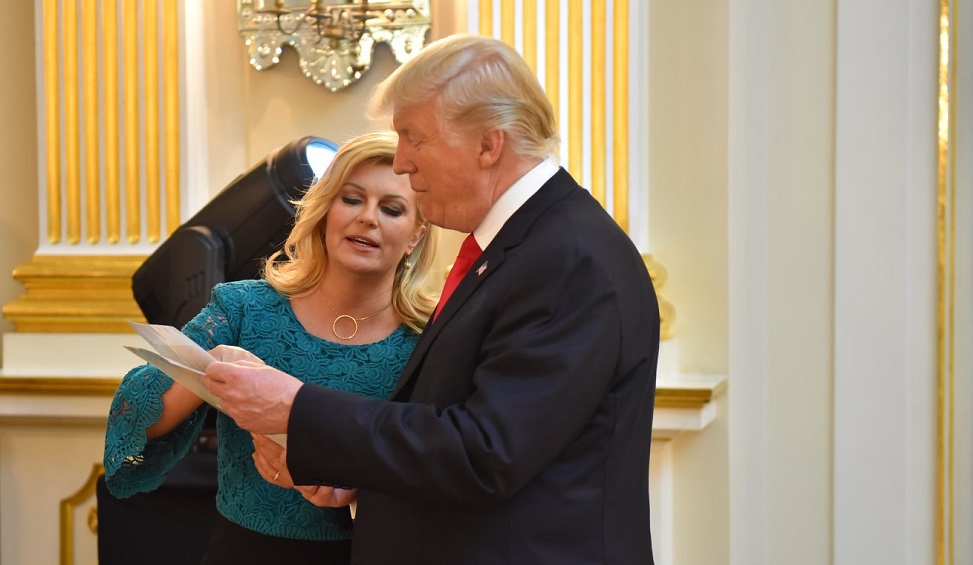
Kolinda Grabar-Kitarović and Donald Trump | Facebook
First Woman and Youngest Croatian President
Kolinda Grabar-Kitarović, born in 1968; has been the President of Croatia since 2015. She was the first woman and the youngest person to ever assume the office. In 2017, Forbes magazine listed Grabar-Kitarović as the world's 39th most powerful woman.
Before her election, Grabar-Kitarović held several governmental and diplomatic positions including Minister of European Affairs, Minister of Foreign Affairs and European Integration, Croatian ambassador to the United States, and NATO Assistant Secretary General for Public Diplomacy.
She was the only female candidate in the Croatian presidential elections held in December 2014 and January 2015 and was runner-up in the first round. She narrowly defeated incumbent President Ivo Josipović in the second round.
International Press Attention at 2018 World Cup
In 2018, Grabar-Kitarović received international press attention for attending the FIFA World Cup quarter-final and final matches, where she wore colors of the Croatian flag in support of the national team, who finished the tournament in second place.
Gaffes and Controversial Endorsements
Her presidential re-election campaign has weathered a series of gaffes and missteps. Last month, she claimed at a campaign rally in Osijek that she had secured jobs for Croatian citizens to work from home for 8000 EUR, after they had received training abroad. However, she later declined to provide details.
While she has positioned herself as a centrist, she welcomed endorsements from several controversial and far right-wing political figures. Marko Perković Thompson, a singer known for his use of WWII Croatian fascist symbols and language in performances, backed her re-election. And Grabar-Kitarović’s website featured a video message from Julienne Bušić, American-born author and activist, who hijacked a TWA flight in 1976 to promote Croatian independence. The party of Zagreb Mayor Milan Bandić, who is facing corruption charges, also endorsed her candidacy.
Former Prime Minister Maintained Solid Lead in First Round
According to exit polls in the first round of elections, held on December 22, 2019; Zoran Milanović maintained comfortable leads over Grabar-Kitarović and Miroslav Škoro, his two main opponents. Grabar-Kitarović was initially polling within one percentage point of Miroslav Škoro, which led to doubts about whether she would advance to the second round. According to final election results, Milanović received 29.55% of the vote and finished ahead of Grabar-Kitarović (26.65%) by nearly three percentage points. In turn, she eliminated Škoro (24.45%) from the run-off by a lead of just over two percentage points.
Grabar-Kitarović and Škoro, a popular folk musician, competed for support from center-right and far-right political parties and organizations, which led some analysts to believe that Škoro supporters would automatically shift their allegiance to the president in the run-off. However, pre-election polls had generated inconclusive results; with the President and former Prime Minister polling within a margin of error and leaving behind a large block of undecided voters. While Škoro confirmed that he would vote at the polls; he declined to endorse either candidate – and said that he would void his ballot.
Both candidates agreed to three debates, which were held on Monday, Thursday and Friday preceding the election. Mutual accusations of incompetence, impropriety and dishonesty dominated the discussions, which offered little on specific policy proposals.
Follow our Politics page for updates on this presidential election and upcoming 2020 parliament elections.
Polling Stations Open in Presidential Runoff in Croatia
ZAGREB, January 5, 2020 - Polling stations opened across Croatia at 7 a.m. Sunday in the presidential runoff in which 3,860,000 eligible voters are choosing between incumbent Kolinda Grabar-Kitarović, supported by the ruling Croatian Democratic Union (HDZ), and former prime minister Zoran Milanović, the candidate of the opposition Social Democrats (SDP).
Election silence went into force at midnight on Friday and ends at 7 p.m. today when polling stations close.
As in the first round of the vote on December 22, there are 6,533 polling stations, of which 6,409 in Croatia and 124 in 47 foreign countries, including 44 in Bosnia and Herzegovina.
Polling stations in Eastern Australia opened first, at 9 p.m. on Saturday Croatian time, while those in Los Angeles will be the last to open, at 4 p.m. on Sunday Croatian time.
A record 24,333 observers will oversee the runoff of Croatia's seventh presidential election, including over 14,000 from the HDZ and nearly 9,000 from the SDP.
The State Electoral Commission will release the first results at 8 p.m. today.
Eleven candidates ran in the first round, with Milanović winning 29.6% of the vote and Grabar-Kitarovič 26.4%. The turnout 14 days ago was 51.19%
More news about the presidential elections can be found in the Politics section.
Croatia Presidential Election Silence: Live Updates Sunday as Polls Close
As of 12:00am Saturday January 4, 2020; the two-day electoral silence is in effect for Croatia. It will end at 7:00pm CET on Sunday, after polling stations close, and TCN will be providing live election updates.
Approximately 3,860,000 second-round voters will decide whether current Croatian President Kolinda Grabar-Kitarović (HDZ) or former Prime Minister President Zoran Milanović (SDP) will head the country for the next five years.
Widespread Electoral Silence Imposed by Croatia SEC
The so-called electoral silence is imposed by the SEC (State Electoral Commission) before any election campaign in Croatia, according to Index on January 3, 2020. On Saturday, the day before an election, and Sunday, election day; the publication of estimates, results and previous unofficial election results are prohibited. This ban also applies to photos, statements and interviews from the two presidential candidates.
The State Election Commission (SEC) urged candidates, their nominees, voters, the media and media publishers to respect the silence.
No Penalties for Violating Electoral Silence
"I urge participants and voters to respect the principles of the electoral silence. I also ask that candidates discontinue promoting themselves or their programs," cautioned SEC Vice President Vesna Fabijančić-Križanić.
“Whether or not the electoral silence is a desirable practice is debatable, but this is the law and it must be respected. We urge everyone abide by the law, even though there aren’t any penalties imposed for violating it," the SEC vice president emphasized.
The SEC reminds the campaigns not to post new posters or leaflets for the two candidates, call citizens, or send them SMS messages or e-mails asking them to vote in this second round of presidential elections.
Social Network and Media Included in Electoral Silence
Social networks are included in the electoral silence as well. Therefore, media and media publishers are expected to remove everything from their program content which represents electoral advertising: including official advertisements, links, image links-ads (banners) which lead to candidates' campaign websites.
At midnight, the deadline for Grabar-Kitarović and Milanović to collect donations also expired. According to reports, the HDZ candidate, received 2.3 million HRK (308,700 EUR) from donors as of December 27, 2019 while the SDP candidate collected 813,000 HRK (109,000 EUR).
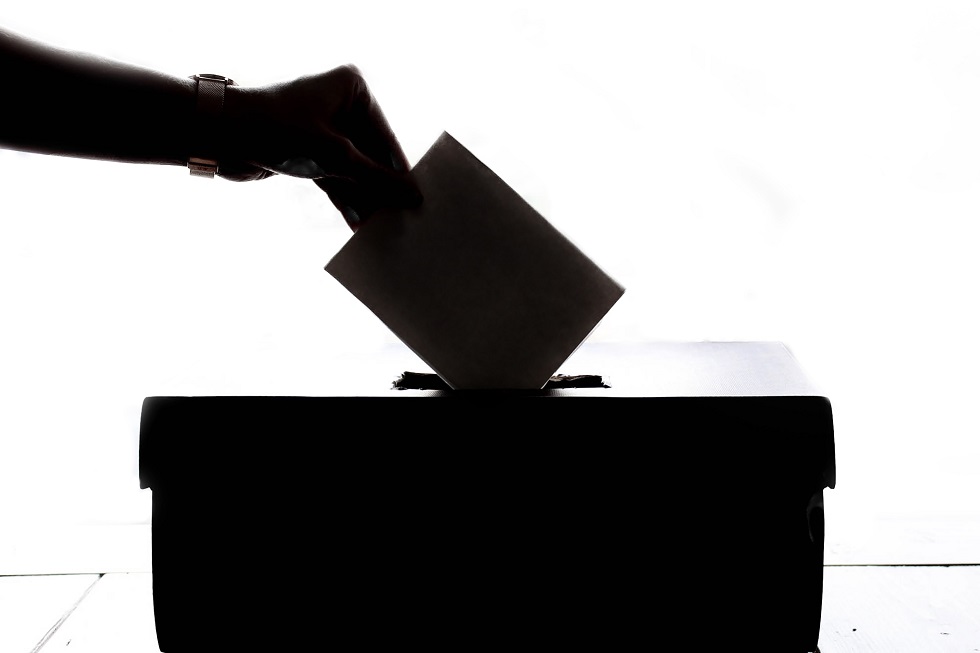
Element5 Digital | Unsplash
Polling Stations Will Open in 47 Countries
Elections for the Croatian president continued to a second round or runoff, because none of the 11 candidates received the required majority in the first election, which was held on Sunday December 22, 2019. The candidate who receives the highest number of votes in this round will win the election.
In addition to Croatia, presidential elections will be held in 47 other countries, with the first polling stations opening in Australia as early as Saturday night, Croatian time (CET).
Live Election Updates on TCN Starting 7:00pm CET
Follow our Politics page for live updates for the upcoming presidential election in Croatia, which takes place tomorrow Sunday January 5, 2020. We will be providing by-the-minute exit poll results and final election results after the polls close at 7:00pm Central European Time (CET).
Croatia President's Campaign Demanded TV Network End Debate
According to a statement released by RTL this morning, an adviser to the Kolinda Grabar-Kitarović campaign demanded that RTL end yesterday’s debate due to the Croatia President’s fatigue. However, both campaigns had already agreed in advance that they would permit the debate, which began at 20h yesterday, December 30, 2019; to last longer than 90 minutes.
In addition, both candidates publicly agreed to continue the debate when asked by RTL moderators during the broadcast, according to Vijesti/RTL on December 31, 2019. The debate, which attracted over 1 million viewers, lasted almost two and a half hours and ended around 22:30h.
RTL Releases Statement About Ending Debate
“The end of the debate was requested by Advisor to the President of the Republic, Ms. Renata Margaretić Urlić, who arrived at RTL studios with members of Croatia President’s campaign headquarters. During the debate, she entered the television control room and demanded that 'due to the prolonged duration of the debate and fatigue of the president, it must end immediately.' When asked by the debate’s editor if that was the official position of the campaign headquarters, Ms. Margaretić Urlić replied that she had 'entered on behalf of the headquarters.'"
The RTL debate moderators conveyed the request (without mentioning who it came from) to presidential candidates Kolinda Grabar-Kitarović and Zoran Milanović, but also offered them the opportunity to continue the debate, to which they both publicly agreed.
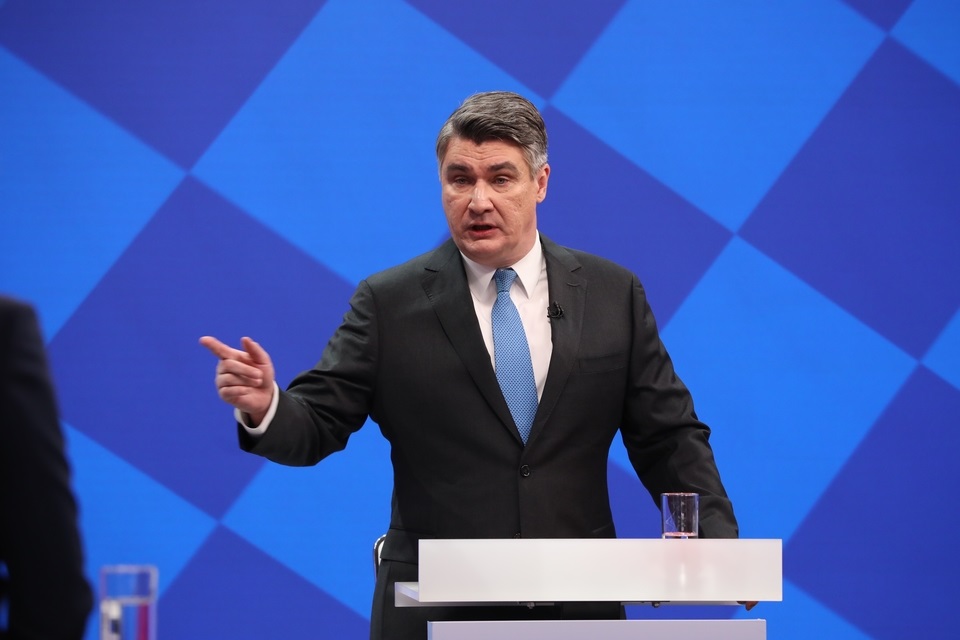
Former Croatia Prime Minister Responds
Upon learning of his opponent’s campaign demand to end the debate; Milanović wrote on Facebook:
“I came to a television debate last night with a severe cold and fever, but at no point did it occur to me to put my mild health problems ahead of the rights of our citizens to see and hear what the presidential candidates have to say. Getting tired of the debate in front of Croatian citizens whose trust you are seeking; what does that mean? If you are not able to talk for two hours about topics that are plaguing Croatia, then you are not capable of leading Croatia. Unless the reasons and motives for interrupting the debate have to do with something else…”
Indeed, the former Prime Minister appeared to have a runny nose and his sniffling was audible, if not distracting, during the entire debate.
Highlights from Monday’s Presidential Debate
Here are a few highlights from the debate according to Index on December 30, 2019:
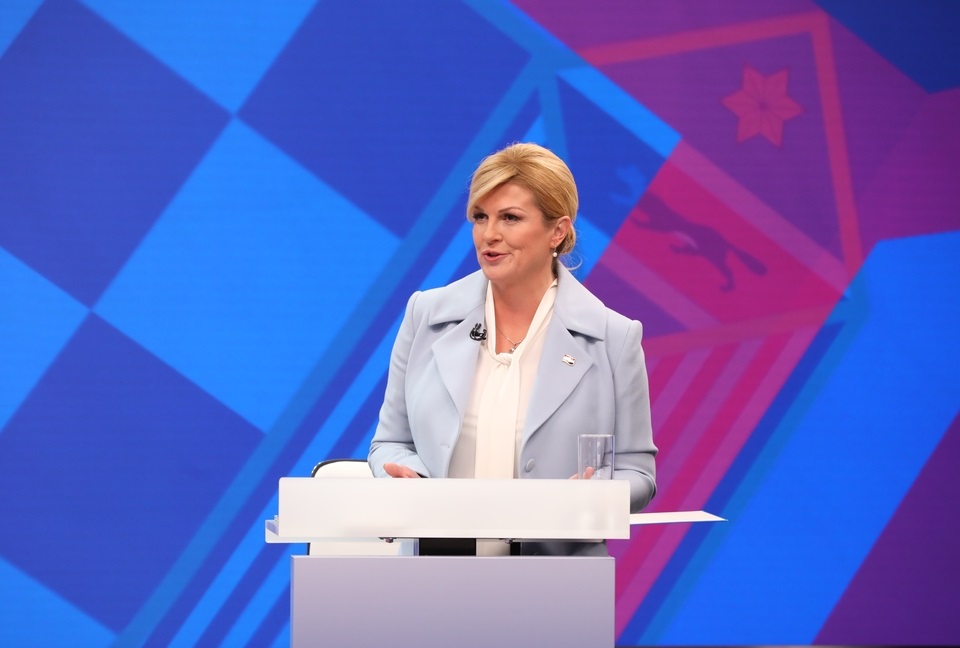
Ms. Grabar-Kitarović, why are you the best choice?
Kolinda: "What I am offering is a program. Our country was in crisis five years ago. The exodus of young people had already begun, and Croatia is in a better position today. I believe that our citizens should take those preexisting macroeconomic factors into account. Every citizen lives better now. I was the change that was needed in 2014, and now I'm looking for continuity."
Milanović got the same question: Why is he a better choice than Kolinda?
Milanović: "I have experience. I will behave in a positive predictable way. I left government while (Croatia) was in a period of growth."
Kolinda: "Croatia was devastated at the time of my arrival and the flames of pessimism were burning."
Milanović: "The year of 2015 ended with growth in the fourth quarter. Interest rates were at their lowest and there was growth in the GDP."
Kolinda: "In terms of experience, apart from experience in Croatia, I have international experience.”
Milanović then pointed out that the Sanader government, in which Kolinda had an appointed seat, still owed Croatia 135 billion HRK (18.1 billion EUR). Note: Former Prime Minister Ivo Sanader was just convicted of corruption and sentenced to 6 years in prison.
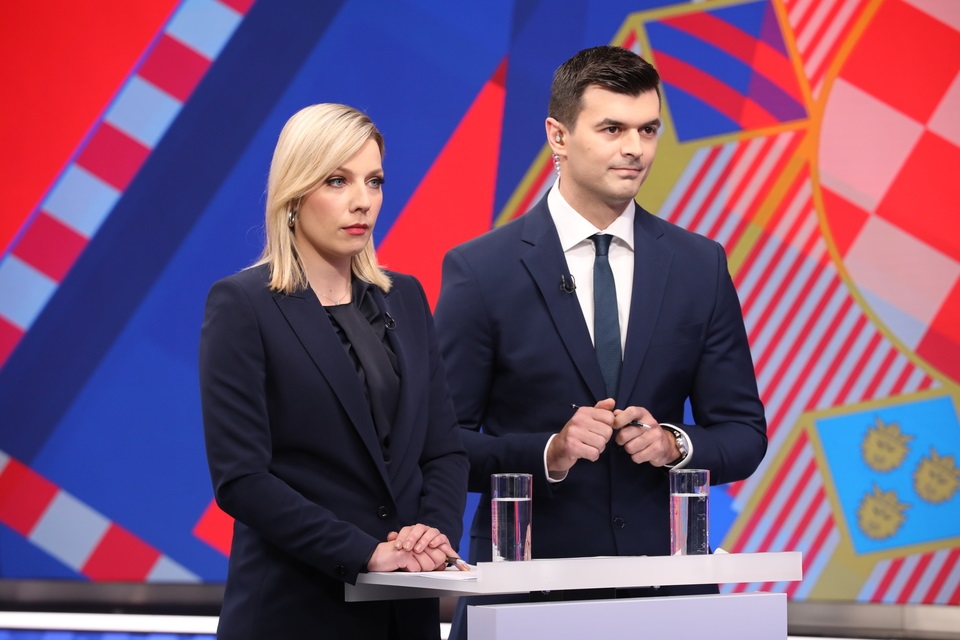
Mr. Milanović, is there anything about Kolinda’s leadership worth commending? Is there anything you would continue to do?
Milanović: "I would not continue."
Mr. Milanović, Vučić attended Kolinda's inauguration, would you have invited him?
Milanović: "I was a career diplomat. Sanader brought Kolinda on board. I did not invite Vučić to Croatia. I do not think that this should be taken out on Serbia. I would not have invited Vučić. But its necessary to work with these people (Serbian citizens). And I mean work with them, not hug them, then create diplomatic chaos and fan flames."
Kolinda: "I'm fanning flames…I said that until he fulfills his promise to find the missing (from the Homeland War), there wouldn't be another in-person meeting."
Milanović: "You were the right hand of political commissioner Ivo Sanader. Vučić create a circus here, and that's your contribution. I can talk to Vučić about missing people, but time goes on, and business goes on too. I will deal with the missing as well as business matters."
Should Croatia block Serbia on its way to the EU?
Milanović: "No. That country has the misfortune of being led by a junkyard war guy. This man is working on behalf of the Belgrade bazaar, but he is not leading the Serbian state and people. But I see a partner (in Serbia) and Croatian companies are working there."
Kolinda: "I decided to stay in Croatia, I am the daughter of a butcher who advanced in position."
Milanović: "You are from a wealthy family and a very slippery person. My father left the (Communist) party."
Kolinda: "For as much as my father had worked in Yugoslavia, he could have been a billionaire in another country."
In Bosnia, most of the voters support HDZ. How can you convince them that you are a better choice?
Milanović: "It doesn't appear that I have their support. But I don't blame them. I'm here to help. When it was necessary to give them millions in funding, we were there. We invested in a series of targeted projects, including building Catholic schools. My conscience is at ease."
Kolinda: "Congratulations. But it would be a good idea to listen to them a little more. You consider them to be second-class citizens and want to deprive them of suffrage."
Milanović: "When did I say that?"
Kolinda: "I am fighting for Bosnia and their voters. For years I have been advocating for Bosnia to enter into a concrete plan for NATO membership."
What do you think about Trump?
Kolinda: "Trump is the President of the United States, and there is currently a court process against him. I did not choose the President of the United States. The way I treat him is governed by my goal of taking care of Croatia's interests. At this stage, we are in the process of signing a double taxation treaty. We are also in the process of abolishing the visa (compulsory for Croatian citizens wishing to visit the US). Of course, I would meet with him in person."
Milanović: "I would not comment on Trump, that was not my choice."
The Euro could be introduced to Croatia in 2023. Are we prepared?
Kolinda: "I think we were ready during the first Sanader government. We moved away from that during your government."
Milanović: "Again, Sanader. A little more and the man will become a demigod. We were not members (of the EU) at the time. While you were hunting for generals (Croatian generals who were indicted by the War Crimes Tribunal and in hiding) around the world, we didn’t have any chance of entering."
Milanović: "Croatia could soon become eligible if it cuts its public debt. Look at the Czech Republic, Hungary and Poland, they are not entering the eurozone, but they could. These are older countries, and they are calculating. The claim that loans will be cheaper does not hold water. That correlation simply doesn't exist. But I'm not against it and am interested in discussing the options. These are complex topics…”
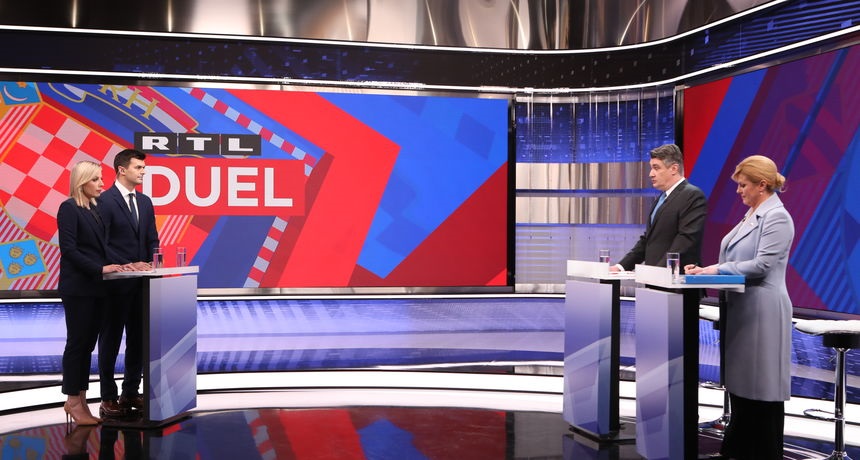
What is your relationship with (Milan) Bandić? What does he have to offer?
Kolinda: "He is the mayor of Zagreb. Everyone is innocent until proven guilty. We cannot find someone guilty and then prove that they are innocent. How many people have been imprisoned and then it turned out that they were imprisoned without cause? This is a principle I will always fight for."
Milanović: "In Croatia, fools are making a living from work, and members of the HDZ are making a living from missing evidence. I defeated him (Bandić) in SDP, and then expelled him from the party. He became your friend when he got out of detention."
Kolinda: "The presumption of innocence exists for everyone."
Milanović: "It is a disaster; this man came into my life when I defeated him in the party elections. These are friends of Ms. Kitarović. Bandić is dangerous and it's a disgrace for the city I live in. Not because he’s Herzegovinian, that’s my origin too, but it's a shady crowd."
Kolinda: "That's a man you once called your friend. I'm working with him to open kindergartens, build stadiums, deal with graffiti."
Let's say you are in Herzegovina and you run into (Zdravko) Mamić, what would you do?
Kolinda: "I would say come back to Croatia and face justice."
Milanović: "I would probably shake hands. I wouldn't say anything to him. He already knows what people think. He is a phenomenal manager, but I don't know why he became a thief."
A video of the debate can be accessed here.
Both presidential candidates will meet for two more debates before the election. On Thursday, January 2, 2020 at 20:05h they will debate on HRT. And on Friday at 20:20h they will face off on Nova TV.
Follow our Politics page for news on the upcoming presidential election in Croatia, which will take place on Sunday, January 5, 2020. We will be providing by-the-minute exit poll results and final election results after the polls close at 19h Central European Time (CET).
First Presidential Debate of Upcoming Elections Held on RTL
After the first planned presidential debate between the two candidates in Croatia hasn't happened on N1 television on Sunday, on Monday evening, their first debate in the runoff round of the presidential elections was held on RTL Television.
Incumbent Croatian President Kolinda Grabar-Kitarović, HDZ candidate, and Zoran Milanović, former Prime Minister and SDP candidate, met in a presidental debate hosted by Damira Gregoret and Ivan Vrdoljak. They were not given the questions and topics to be discussed in advance, so they were not able to rehearse their answers and reactions.
The debate ended up lasting well over two hours, and on several occasions both candidates wondered out-loud if the audience was already fed up with their answers.
Supposedly, Milanović's team wanted to stop the debate because they thought that it was running for too long, although after the debate was over the team denied that. The format was somewhat unorthodox, so they got to ask each other questions. Many of the questions asked in the debate had nothing to do with the actual duties of the President of Croatia, so it seemed that they fought on principle more than on actual topics they can influence when one of them wins the presidency.
As is quite customary in Croatian politics, there was a lot of talk about the past, including their relationships to former President Tuđman and former Prime Minister Sanader, who was today found guilty in a major court case against him. The numerous online commenters, as well as Ankica Mamić and Božo Skoko for Večernji list commented that neither of the candidates really made a great impression in the presidential debate, as Milanović seemed much more aggressive, while the incumbent President failed to assert herself more.
It is expected that the two will debate at least twice more before Sunday, January 5, 2020, when the runoff will take place, and Croatians will get to chose between the two candidates.
Milanović Has Spent 1.5 Million Kuna, Grabar-Kitarovic 5.4 Million Kuna
ZAGREB, December 30, 2019 - The opposition Social Democratic Party's presidential candidate Zoran Milanović spent 1.5 million kuna on his campaign by December 27 while the ruling Croatian Democratic Union's candidate, incumbent Kolinda Grabar-Kitarović, spent 5.4 million kuna, according to financial statements released on Monday.
The statements, posted on the State Election Commission's website, contain data on expenses, contributions and advertising.
The total costs will be known after the two candidates submit final financial statements by February 4, a month after the January 5 second round of the presidential election. Under the law, each can spend 9.6 million kuna on campaigning.
By December 27, Grabar-Kitarović spent 2.5 million kuna on advertising, whereas Milanović spent 12,400 kuna. Grabar-Kitarovic received 2.3 million kuna from 347 contributors and Milanovic 813,000 kuna from 50.
The nine other candidates who ran in the first round of the presidential election must submit financial statements on their campaigns by January 21.
More news about presidential elections can be found in the Politics section.

